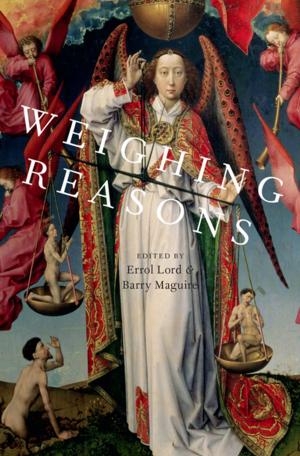Inheriting Wealth in America
Future Boom or Bust?
Business & Finance, Finance & Investing, Finance, Personal Finance| Author: | Edward N. Wolff | ISBN: | 9780199353972 |
| Publisher: | Oxford University Press | Publication: | January 27, 2015 |
| Imprint: | Oxford University Press | Language: | English |
| Author: | Edward N. Wolff |
| ISBN: | 9780199353972 |
| Publisher: | Oxford University Press |
| Publication: | January 27, 2015 |
| Imprint: | Oxford University Press |
| Language: | English |
Inheritances are often regarded as a societal "evil," enabling great fortunes to be passed from one generation to another, thus exacerbating wealth inequality and reducing wealth mobility. Discussions of inheritances in America bring to mind the Vanderbilts, Rockefellers, and "trust fund babies"---people who receive enough money through inheritances or gifts that they do not have any need to work during their lifetime. Though these are, of course, extreme outliers, inheritances in America have a reputation for being a way the rich keep getting richer. In Inheriting Wealth in America, Edward Wolff seeks to counter these misconceptions with data and arguments that illuminate who inherits what in the United States and what results from these wealth transfers. Using data from the Survey of Consumer Finances---a triennial survey conducted by the Federal Reserve Board that contains detailed information on household wealth, inheritances, and gifts---as well as the Panel Study of Income Dynamics and a simulation model over years 1989 to 2010, Wolff reports six major findings on the state of inheritances in America. First, wealth transfers (inheritances and gifts) accounted for less than one quarter of household wealth. However, for persons age 75 and over, the figure was about two-fifths since they have more time to receive wealth transfers. Indirect evidence, derived from the simulation model, indicates a figure closer to two-thirds at end of life - probably the best estimate. Second, despite prognostications of a coming "inheritance boom," it has not materialized yet. Only a small (and statistically insignificant) uptick in average wealth transfers was observed over the period, and wealth transfers were actually down as a share of household wealth. Third, while wealth transfers are greater in dollar amount for richer households than poorer ones, they constitute a smaller share of the accumulated wealth of the rich. Fourth, contrary to popular belief, inheritances and gifts, on net, reduce wealth inequality rather than raising it. The rationale is that inheritances and particularly gifts typically flow from richer to poorer persons, thus lowering wealth inequality. Fifth, despite a rapid rise in income inequality, the inequality of wealth transfers shows no discernible time trend from 1989 to 2010, neither upward nor downward. Sixth, among the very wealthy, the share of wealth accounted for by wealth transfers is surprisingly low, only about a sixth, and this share has trended significantly downward over time. It is true that inheritances and gifts are unequal, with only one fifth of families receiving wealth transfers and these transfers benefitting the rich far more than the middle class and the poor. That, however, is not the whole picture of inheritances in America. Clearly-written and illuminating, this books expertly distills an abundance of data on inheritances into important takeaways for all who wonder about the current state of inheritances and gifts in the United States.
Inheritances are often regarded as a societal "evil," enabling great fortunes to be passed from one generation to another, thus exacerbating wealth inequality and reducing wealth mobility. Discussions of inheritances in America bring to mind the Vanderbilts, Rockefellers, and "trust fund babies"---people who receive enough money through inheritances or gifts that they do not have any need to work during their lifetime. Though these are, of course, extreme outliers, inheritances in America have a reputation for being a way the rich keep getting richer. In Inheriting Wealth in America, Edward Wolff seeks to counter these misconceptions with data and arguments that illuminate who inherits what in the United States and what results from these wealth transfers. Using data from the Survey of Consumer Finances---a triennial survey conducted by the Federal Reserve Board that contains detailed information on household wealth, inheritances, and gifts---as well as the Panel Study of Income Dynamics and a simulation model over years 1989 to 2010, Wolff reports six major findings on the state of inheritances in America. First, wealth transfers (inheritances and gifts) accounted for less than one quarter of household wealth. However, for persons age 75 and over, the figure was about two-fifths since they have more time to receive wealth transfers. Indirect evidence, derived from the simulation model, indicates a figure closer to two-thirds at end of life - probably the best estimate. Second, despite prognostications of a coming "inheritance boom," it has not materialized yet. Only a small (and statistically insignificant) uptick in average wealth transfers was observed over the period, and wealth transfers were actually down as a share of household wealth. Third, while wealth transfers are greater in dollar amount for richer households than poorer ones, they constitute a smaller share of the accumulated wealth of the rich. Fourth, contrary to popular belief, inheritances and gifts, on net, reduce wealth inequality rather than raising it. The rationale is that inheritances and particularly gifts typically flow from richer to poorer persons, thus lowering wealth inequality. Fifth, despite a rapid rise in income inequality, the inequality of wealth transfers shows no discernible time trend from 1989 to 2010, neither upward nor downward. Sixth, among the very wealthy, the share of wealth accounted for by wealth transfers is surprisingly low, only about a sixth, and this share has trended significantly downward over time. It is true that inheritances and gifts are unequal, with only one fifth of families receiving wealth transfers and these transfers benefitting the rich far more than the middle class and the poor. That, however, is not the whole picture of inheritances in America. Clearly-written and illuminating, this books expertly distills an abundance of data on inheritances into important takeaways for all who wonder about the current state of inheritances and gifts in the United States.















